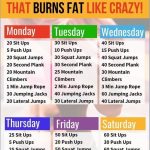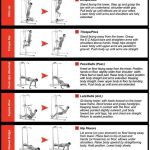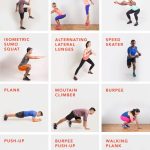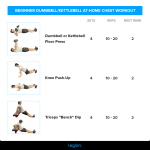Revitalize Your Body With These 7 Full Body Exercises: Unleash Your Potential Now!
7 Full Body Exercises: A Complete Guide to Strengthen Your Body
Introduction
Hello, Readers! Are you looking for effective ways to strengthen your body and achieve overall fitness? Well, look no further because we have got you covered! In this article, we will discuss 7 full body exercises that will help you tone your muscles, improve your cardiovascular health, and boost your overall fitness level. Whether you are a fitness enthusiast or just starting your fitness journey, these exercises are perfect for you. So, let’s dive in and discover the amazing benefits of these 7 full body exercises!
1 Picture Gallery: Revitalize Your Body With These 7 Full Body Exercises: Unleash Your Potential Now!

Table of Contents
1. What are Full Body Exercises?

Image Source: pinimg.com
2. Who can Benefit from Full Body Exercises?
3. When is the Best Time to Perform Full Body Exercises?
4. Where can Full Body Exercises be Done?
5. Why are Full Body Exercises Important?
6. How to Perform Full Body Exercises Correctly?
1. What are Full Body Exercises? 🏋️♀️
Full body exercises, as the name suggests, are workouts that engage multiple muscle groups across various parts of your body simultaneously. These exercises target both the upper and lower body and are designed to provide a comprehensive workout experience. By engaging multiple muscles at once, full body exercises help you burn more calories, improve your overall strength and endurance, and enhance your functional fitness.
2. Who can Benefit from Full Body Exercises? 🌟
Full body exercises are suitable for individuals of all fitness levels. Whether you are a beginner or a seasoned athlete, these exercises can be tailored to meet your specific needs and goals. They are highly effective for weight loss, muscle building, improving cardiovascular health, and enhancing overall fitness. Additionally, full body exercises are time-efficient, making them perfect for individuals with busy schedules who want to maximize their workout results in a shorter amount of time.
3. When is the Best Time to Perform Full Body Exercises? ⏰
There is no specific time that is considered the best for performing full body exercises. The timing can vary based on your personal preferences and schedule. Some people prefer to exercise in the morning to kickstart their day with energy, while others find it more convenient to work out in the evening to relieve stress and unwind. The most important thing is to choose a time that works best for you and allows you to stay consistent with your exercise routine.
4. Where can Full Body Exercises be Done? 🌍
The beauty of full body exercises is that they can be done anywhere, anytime. Whether you prefer working out at the gym, in the comfort of your home, or outdoors, these exercises require minimal equipment and space. You can perform them using your body weight or incorporate simple equipment such as dumbbells, resistance bands, or a stability ball to add variety and challenge to your workouts. The versatility of full body exercises allows you to stay active and fit regardless of your location.
5. Why are Full Body Exercises Important? ❓
Full body exercises offer numerous benefits that contribute to your overall health and fitness. Firstly, they increase your muscle mass and strength by engaging multiple muscle groups, leading to improved functional fitness and better performance in daily activities. Secondly, these exercises elevate your heart rate, promoting cardiovascular health and endurance. Moreover, full body exercises help burn calories more effectively, making them an excellent choice for weight management. Lastly, they enhance your body’s stability, balance, and coordination, reducing the risk of injuries and improving your body’s overall movement patterns.
6. How to Perform Full Body Exercises Correctly? 📝
To perform full body exercises correctly and maximize their benefits, it is essential to follow proper form and technique. Here are some key points to keep in mind:
Start with a warm-up session to prepare your muscles for the workout.
Focus on proper breathing techniques, inhaling during the easier part of the exercise and exhaling during the more challenging part.
Maintain proper alignment and posture throughout the exercises.
Gradually increase the intensity and duration of your workouts as your fitness level improves.
Stay hydrated and listen to your body, taking rest days when needed.
Consider working with a qualified fitness professional to ensure proper guidance and prevent injuries.
Advantages and Disadvantages of Full Body Exercises
Advantages (Pros) of Full Body Exercises
1. Efficient use of time: Full body exercises engage multiple muscle groups in one workout, saving you time.
2. Increased calorie burn: These exercises help burn more calories due to the involvement of multiple muscles.
3. Improved functional fitness: Full body exercises enhance your overall strength, endurance, and movement patterns.
4. Versatility: These exercises can be adapted to different fitness levels and performed anywhere.
5. Balanced muscle development: Full body exercises ensure that all major muscle groups are worked evenly.
Disadvantages (Cons) of Full Body Exercises
1. Fatigue: Full body exercises can be intense and may lead to increased fatigue, especially for beginners.
2. Overtraining risk: Without proper rest and recovery, excessive full body workouts can lead to overtraining and injuries.
3. Limited focus on specific muscle groups: If your goal is to target specific muscle groups, other types of exercises may be more effective.
4. Equipment limitations: While full body exercises can be done without equipment, some variations may require specific equipment.
5. Learning curve: Proper form and technique are crucial for full body exercises, which may require some learning and practice.
FAQs (Frequently Asked Questions)
1. Can I do full body exercises every day?
While full body exercises can be performed frequently, it is recommended to have rest days to allow your muscles to recover and prevent overuse injuries. Aim for 2-3 days of full body workouts per week with rest or active recovery days in between.
2. Can full body exercises help with weight loss?
Yes, full body exercises are highly effective for weight loss as they engage multiple muscle groups and increase calorie burn. Combined with a balanced diet, these exercises can contribute to your weight loss goals.
3. Do I need equipment to perform full body exercises?
No, full body exercises can be done using your body weight alone. However, incorporating simple equipment like dumbbells or resistance bands can add variety and challenge to your workouts.
4. Can full body exercises improve my posture?
Yes, full body exercises that target core muscles and promote overall strength can help improve your posture by enhancing your body’s stability and alignment.
5. How long should a full body workout session be?
The duration of a full body workout session can vary based on your fitness level and goals. Generally, aim for 30-60 minutes of exercise per session, including warm-up and cool-down periods.
Conclusion
Friends, incorporating 7 full body exercises into your fitness routine is a fantastic way to achieve a strong and healthy body. These exercises offer a wide range of benefits, including improved muscle strength, enhanced cardiovascular health, and increased calorie burn. Remember to prioritize proper form, listen to your body, and gradually progress in intensity to avoid injuries and maximize results. So, what are you waiting for? Start incorporating these full body exercises into your fitness regimen and experience the incredible transformation they can bring to your overall fitness level!
Final Remarks
In conclusion, always consult with a healthcare professional or certified fitness trainer before starting any new exercise program. It is vital to consider your individual health conditions, limitations, and fitness goals when choosing and performing full body exercises. This article is intended for informational purposes only and should not replace professional advice. Stay committed, stay motivated, and enjoy the journey towards a stronger and healthier you!
This post topic: Workout Routines



